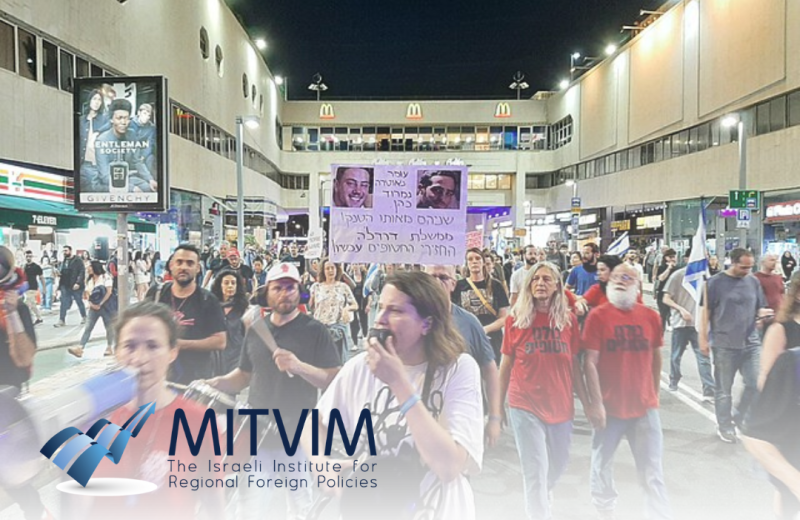 Op-eds
/ The Gaza Campaign
Op-eds
/ The Gaza Campaign
There is a widespread perception globally that the October 7th massacre and the subsequent war have pushed the Israeli public toward the far right. This narrative suggests that while Israelis are highly critical of the government’s handling of the war, their views on matters such as Israeli-Palestinian settlement or the conflict with Iran and Hezbollah have shifted closer to the hawkish positions of the current right-wing government.
The Mitvim Institute’s 2024 Israeli Foreign Policy Index, compiled almost a year after the outbreak of the Gaza war, challenges the notion that the Israeli public moved sharply to the right. It reveals that when Israelis are asked to consider long-term strategies regarding Gaza, Lebanon, the West Bank, and Iran, a majority of them favor diplomatic solutions. This shift reflects not a leftward movement but rather a turn towards pragmatism. This emerging trend presents an opportunity for Europe to lead, together with Middle-Eastern partners, a bold, long-term vision for peace and stability in the Middle East. Outlining a vision becomes crucial as the region gradually transitions toward a regional conflict, with shockwaves likely to reverberate across the Mediterranean.
Mitvim’s survey reveals two main trends in the Israeli public – one of broad agreement and the other of deep polarization. The first trend is the rejection of the conflict management approach and the public ambition to seek decisive solutions. Only 12% said Israel should avoid strategic measures and adhere to the pre-war situation in its relations with the Palestinians. However, it is this recognition that strategic decisions can no longer be avoided that divides Israelis, leading to two radically different perceptions of what these decisions signify. Hence, the Index highlights polarization between two camps.
The pragmatists, comprising a small relative majority of about 40-50% of the public, support the setting of a political horizon with the Palestinians within a broad regional framework, recognize the limitations of military power, and seek diplomatic cooperation to solve Israel’s security problems. They back regional cooperation as a primary means of advancing an end to the war. They support a package deal that includes normalization with KSA, a US security umbrella, and the establishment of a demilitarized Palestinian state (44%); see a regional coalition as the main solution to the Iranian threat (46%); and support the deployment of a multinational force as a temporary solution after hostilities in Gaza cease (46%).
The other camp, the fundamentalists, are a large minority (about 30%) that currently adopt positions which were the radical right domain prior to the war. This camp favors annexation of the West Bank and resettlement in Gaza (29%), independent Israeli military campaign against Iran (32%), and reliance on an independent military action.
While the survey was conducted before Nasrallah’s elimination and the escalation of the Iran-Israel war, it still reflects a significant preference among Israelis for diplomatic solutions. Even after 10 bitter months of Hezbollah’s shelling and failed diplomatic efforts to stop this unprovoked attack, not to mention the failure of the international community to fulfill UNSCR 1701 and prevent the armament of Hezbollah, a majority of the Israeli public still opt for a diplomatic solution if one could be found. 51% pavor a diplomatic solution whether in the form of an immediate negotiated withdrawal of Hezbollah beyond the Litani river, or a longer-term Israeli-Lebanese agreement. 60% opt for diplomatic options when examining long-term strategies to deal with Iran.
Mitvim’s index highlights that a majority of Israelis align with European policymakers on key issues, notably that the war’s end should coincide with broader Israeli-Palestinian-international efforts for a settlement. They also favor long-term diplomatic solutions with Iran and its proxies, provided Israel’s security remains intact. Most importantly – the public mindset in Israel is a mindset of decisive steps, offering a unique opportunity for the international community—especially Europe—to present a bold Middle East vision. As the U.S. approaches elections, the Biden administration is likely to avoid risky agenda-setting, making it crucial for Europe and MENA actors to lead a new coalition for peace and stability. At the brink of an uncontrolled regional conflict, Europe must lead the efforts to outline an alternative future for the Middle-East. It should channel this devastating year of warfare into an opportunity for generating new political momentum for long-term stability.
The article was publish on October 7th, 2024 in the Frankfurter Allgemeine.


